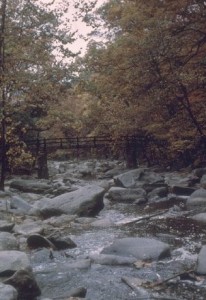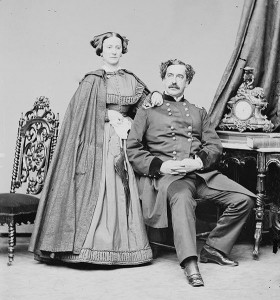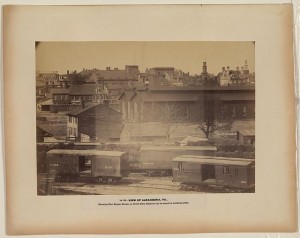We’ve been following the 19th NY Volunteer Infantry from the Cayuga County area of New York State. The regiment has been drilling at their encampment in the Kalorama area of the District of Columbia for about a month. That’s all about to change, but before the 19th departs I’d like to mention that Henry Hall remembered the time at Kalorama as generally healthy, except for a few cases of the measles. The first death in the regiment occurred when Joseph Winters, the drummer boy from Company C drowned in D.C.’s Rock Creek while bathing. Also, Henry Hall says that the reinforcements for General Patterson, of which the 19th was a part, were intended by General Winfield Scott to prod Patterson to action in his mission to keep the rebels in the Shenandoah Valley busy while General McDowell advanced on Richmond.
From Cayuga in the Field by Henry Hall and James Hall:
Col. Clark, on the afternoon of July 5th, received the following order: —
” Col. Clark, 19th Regiment, New York Volunteers, is directed to be in readiness by noon, to-morrow, to march his regiment on special service, with three days’ cooked provisions and three days’ raw, which he will prepare forthwith. He will leave all extra baggage in his camp with sick and disabled men and sufficient tents for their use. Wagons for transportation will be at his camp at 12 o’clock at noon. Col. Clark will draw forty rounds of ammunition early to-morrow. He will have all his tents and ordinary baggage packed by 12 o’clock.
By Order,
Maj.-Gen. Charles W. Sandford.
Geo. W. Morell, Div. Inspector.”
Communicated to the regiment, the orders were joyfully received, and the camp fell vigorously to packing and preparing for the march. Letters were hastily written home ; knapsacks were packed; rations of meat were cooked; surplus baggage was disposed of and everything made ready for an early start next day. The larger part of the night was devoted to this work. …
At 6 A. M. of the 6th, “Strike tents” was proclaimed in Camp Cayuga. The once orderly camping ground became a scene of bustle, confusion and uproar for an hour or two, and the folded tents, with baggage and camp equipage, then lay packed on the ground and arranged in piles ready for loading into the wagons, which were to take them to the railroad depot, A small guard remained to watch the baggage and load the wagons. At 10 1-2 A.M., the regiment filed away from beautiful Kalorama and hastened in a pouring rain storm to the depot in Washington. Dr. Howard remained with ten sick in a hospital tent. …
The day before, a thirty pound rifled Parrot cannon left this depot on a freight car, labeled “Capt. A. Doubleday, Williamsport, Md.” It was part of the impedimenta of the 19th New York.
A cordial reception in Baltimore awaited the regiment on this occasion. The aspect and spirit of the rabid old city had materially changed since the 7th of June. Gen. Banks’s cannon on Federal Hill had done a marvelous work. Cheers were repeatedly given by the populace, and fluttering handkerchiefs now waved graceful greetings from balconies. Freight cars were supplied at the Harrisburg depot, and, jammed unpleasantly tight in them, the regiment rattled away at nightfall at a fearful rate of speed toward the capital of Pennsylvania. There was little chance for “nature’s sweet restorer” that hot night. The cars were packed to oppression, while the fearful rumbling and jolting so banished slumber from the eyes of the more volatile that they sat up, sang ” John Brown,” ” Hail Columbia,” and everything else an inventive imagination could suggest, and cracked jokes and plagued the sleepy, so that it would have defied Dickens’s Fat Boy himself to catch a nap the duration of a wink. Fresh, cool air, the perspiring occupants of these veritable din mills obtained by jamming pointed Gothic windows through the car sides with their muskets. Other obstacles to repose could not be overcome.
I’ve heard of gin mills; these din mills don’t sound like too much fun.
According to Wikipedia, after his service at Fort Sumter Abner Doubleday “… was promoted to major on May 14, 1861, and commanded the Artillery Department in the Shenandoah Valley from June to August …”, so I guess the 19th did send their cannon to the right person.
In one of his (different) letters home Oscar Langford stated that the drummer who drowned was 17 years old.



